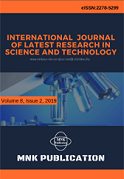DOI:10.29111/ijlrst ISRA Impact Factor:3.35
Research Paper Open Access
International Journal of Latest Research in Science and Technology Vol.3 Issue 4, pp 186-194,Year 2014
Correspondence should be addressed to :
Received : 26 June 2014; Accepted : 01 July 2014 ; Published : 31 August 2014

| Download | 125 |
|---|---|
| View | 179 |
| Article No. | 10375 |
In real optimization problems is generally desirable to optimize more than one performance criterion (or objective) at the same time. The goal of the multi-objective combinatorial optimization (MOCO) is to optimize simultaneously r > 1 objectives. We developed a GRASP algorithm that incorporates a memory-based approach for solving the multiobjective multidimensional knapsack problem. There are, in the scientific literature, some memory-based GRASP algorithms for mono-objective problems, however it was not found any memory-based GRASP algorithm for multiobjective problems. Computational experiments on benchmark instances show that the proposed algorithm is very robust and outperforms other heuristics in terms of solution quality and running times.
Copyright © 2014 Dalessandro Soares Vianna et al. This is an open access article distributed under the Creative Commons Attribution 4.0 International (CC BY 4.0) license which permits unrestricted use, distribution, and reproduction in any medium, provided the original work is properly cited.
Dalessandro Soares Vianna,Ferm?n Alfredo Tang Montan?,Edwin Benito Mitacc Meza, Carlos Bazilio Martins , " A Memory-based Grasp Heuristic For The Multiobjective Multidimensional Knapsack Problem ", International Journal of Latest Research in Science and Technology . Vol. 3, Issue 4, pp 186-194 , 2014

MNK Publication was founded in 2012 to upholder revolutionary ideas that would advance the research and practice of business and management. Today, we comply with to advance fresh thinking in latest scientific fields where we think we can make a real difference and growth now also including medical and social care, education,management and engineering.

We offers several opportunities for partnership and tie-up with individual, corporate and organizational level. We are working on the open access platform. Editors, authors, readers, librarians and conference organizer can work together. We are giving open opportunities to all. Our team is always willing to work and collaborate to promote open access publication.

Our Journals provide one of the strongest International open access platform for research communities. Our conference proceeding services provide conference organizers a privileged platform for publishing extended conference papers as journal publications. It is deliberated to disseminate scientific research and to establish long term International collaborations and partnerships with academic communities and conference organizers.